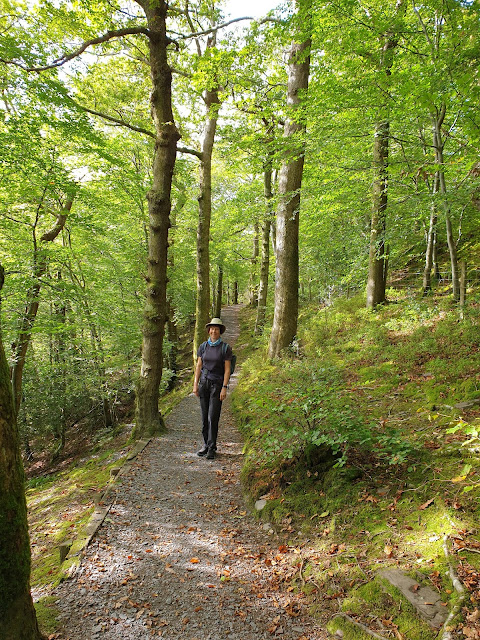
Today we drove in drizzle to Barmouth, where £2.20 in a car park machine allowed us to stay for 4 hours - just long enough to enjoy a 10km walk.
We started along the promenade, passing a dolphin statue, and a fine sculpture of men rowing.
Steep steps led up to an area owned by the National Trust.
Cae Fadog leads on to a small hill, Dinas Oleu, with fine views over the estuary. We paused for elevenses near here. In 1895 this was the first property donated to the National Trust - by philanthropist Fanny Talbot, who donated it because she wanted it 'secure for the public forever'.
Further along the path, a diversion to see 'the Frenchman's Grave'. On the right in the picture below is a plaque with Auguste Guyard's epitaph, and ahead is his grave, with the epitaph faintly visible on the headstone. This Frenchman escaped from the Franco-prussian war of 1871. He made friends with Ruskin and made a home as a plantsman here in Barmouth.
His epitaph reads as follows:
"Here lies a Sower who
Sowed right up to the grave,
Truth, Goodness and Beauty,
with idolatry,
Through a thousand battles of
the pen and of the hands.
Such works in this world are not compensated for."
Further along the grassy path, sheepsbit scabious made a brief appearance, and later a red kite graced the airways.
A circular stone enclosure provides good shelter from the wind, as well as being an excellent viewpoint. The post in view below has a QR code that can be scanned to reveal a website with lots of information about the area. I'll insert a link in due course.
Further up the hill, another post with a QR code gives access to information about the ruins of the mine buildings at Cell-fechan.
There are also dark, wet, low tunnels disappearing into the hillside - signs of the former industries of the area. Tourism and farming are much 'cleaner'!
There are several different walking routes here.
Rising paths lead to the isolated cottage of Gellfawr.
Beyond this, grassy tracks (sadly embossed with the tyre prints of trial bikes) took us to a high point of the walk, with views down to stone walls that reveal the natural features in a sinuous series of field boundaries.
Here, we met and chatted to another couple - doing the same walk, but from an earlier, Kittiwake, guidebook. (A number of Alex's routes are identical to those in other, earlier, publications!)
Another couple, going the other way, needed reassuring as to their ability to find their way, mapless, to Barmouth. I'm sure they would have made it. These were virtually the only other people seen on these paths today.
Next to our 'chat spot' was an ideal lunch spot with a fine view once a drizzly shower had dissipated.
Soon afterwards, another sheep with a view - just like the one we saw on Cnicht a couple of days ago.
Now on the descent, views stretched along the coast, with all its caravan parks, across to the Lleyn peninsular.
A walled lane with a very rough surface led down to meet the main road outside St Mary and St Bodfan's Church in Llanaber.
Delicious sweet blackberries distracted us.
The present church dates back to the 13th century, and the site has a rich history dating back to the 6th century, when St Bodfan, a Celtic missionary from Bardsey Island, first founded a church here.
Our first attempt to reach the beach was foiled by a closed (for no apparent reason) railway bridge, but we found a way down soon afterwards and concluded our day's walk with a pleasant stroll along the beach.
Here's our route - 10km with 300 metres ascent, taking a leisurely just less than four hours.



























































